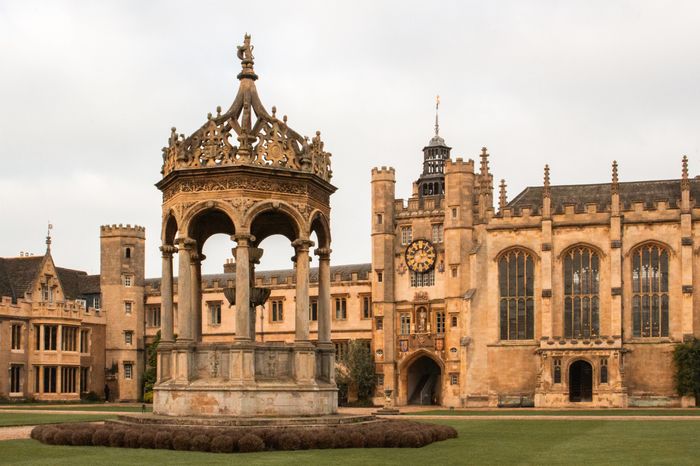Campaigns for divestment ‘gone a bit too far’ says former Trinity Master
Ongoing debates over arms companies are happening across the University in response to the war in Gaza

Lord Martin Rees, a former Master of Trinity College, told Varsity that “campaigns for divestment – and fussiness about the source of donations – have gone a bit too far” amid ongoing debates in Cambridge over the divestment of fossil fuels and arms.
Rees was the Master of Trinity College from 2004 to 2012 and sits in the House of Lords with no party affiliation. He is known for his pioneering work on galaxy formation, quasars, and black holes, and is also the fifteenth Astronomer Royal, the most prestigious post in British astronomy.
He told Varsity that “My personal view is that the morality of investing in fossil fuels or defence depends if you have any influence.”
“On fossil fuels, if we disinvest […] that’s nothing to Shell or a big company like that. And if one wants to have a benign influence in making companies greener, then an influential person going to their shareholders’ meeting and making a speech will have more impact than taking away 0.1% of their shares which are likely to be bought by a less punctilious investor.”
Rees continued: “So, I do think it is an acceptable choice to go on investing in these fossil fuels, but that gives the University an obligation to campaign that they should become greener.”
Over the last few years, many colleges have made the decision to divest in fossil fuels, including Trinity, where Reese is a fellow. Trinity has committed to fully divest from the sector by 2031, and Corpus Christi, Pembroke and Newnham have all made similar pledges.
The University has also pledged to fully divest from fossil fuels by 2038 as a part of a “net zero” plan to ensure that its £3.5 billion endowment does not have any direct investments in fossil fuels.
Commenting on investing in arms companies, Rees said: “Especially given the present state of the world, I think it would be unreasonable not to support any defence company, unless one is going to take a complete pacifist view.”
Ongoing debates over arms companies are happening across the University in response to the war in Gaza.
Trinity College recently announced that they are backtracking from divestment in arms companies after the Master, Dame Sally Davies, told students that there was a “consensus” in the College against cutting ties with defence companies.
Trinity holds investments in multiple arms companies, including Elbit Systems which produces 85% of the drones and land-based equipment used by the Israeli army.
Days after the announcement, an “emergency rally” was organised by students to express “anger” at Trinity’s decision to backtrack.
At the end of November, the activist group Cambridge for Palestine also occupied Greenwich House, where the University’s finance offices are located, demanding that the University “immediately carry out an aggregate analysis of its investments”.
The group had previously set up an encampment outside King’s College, which they had agreed to dismantle in early August following the University’s promise to review its arms investments.
In response to Rees’s comments, the Trinity College Student Union (TCSU) and postgraduate (BA Society) students’ union shared a joint statement with Varsity which said: “As representatives of Trinity College’s student body, we will not comment on the personal views or opinions of individual fellows or members of the college. However, regarding Trinity’s investments, we would like to refer to the open letter signed and circulated by the BA Society and TCSU in November 2024 calling for divestment from the arms industry.”
“This was concomitant with students’ concerns about Trinity’s investment in companies complicit in the humanitarian crises in Gaza. As we wrote in that letter, we hold that investment in arms companies is directly antithetical to our College’s professed aims as an institution of higher education and research. We intend to continue advocating for ethical investment at Trinity,” the statement continued.
Rees also spoke to Varsity about the decision last May for the Hay book festival to drop their main sponsor, Baille Gifford. This was prompted by boycotts from authors over the investment manager’s links to Israel and fossil fuel companies.
“I thought the authors were being a bit unreasonable because Baille Gifford is not an especially wicked company and in any case the money would have been used for a very good purpose,” Rees said.
Want to share your thoughts on this article? Send us a letter to letters@varsity.co.uk or by using this form.
 Comment / Cambridge’s tourism risks commodifying students18 April 2025
Comment / Cambridge’s tourism risks commodifying students18 April 2025 News / Cambridge student numbers fall amid nationwide decline14 April 2025
News / Cambridge student numbers fall amid nationwide decline14 April 2025 News / Greenwich House occupiers miss deadline to respond to University legal action15 April 2025
News / Greenwich House occupiers miss deadline to respond to University legal action15 April 2025 Comment / The Cambridge workload prioritises quantity over quality 16 April 2025
Comment / The Cambridge workload prioritises quantity over quality 16 April 2025 Sport / Cambridge celebrate clean sweep at Boat Race 202514 April 2025
Sport / Cambridge celebrate clean sweep at Boat Race 202514 April 2025





